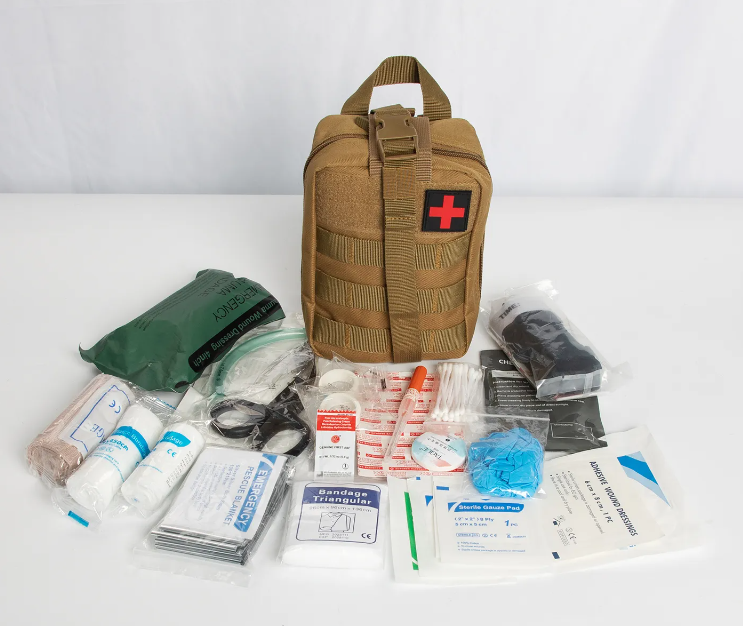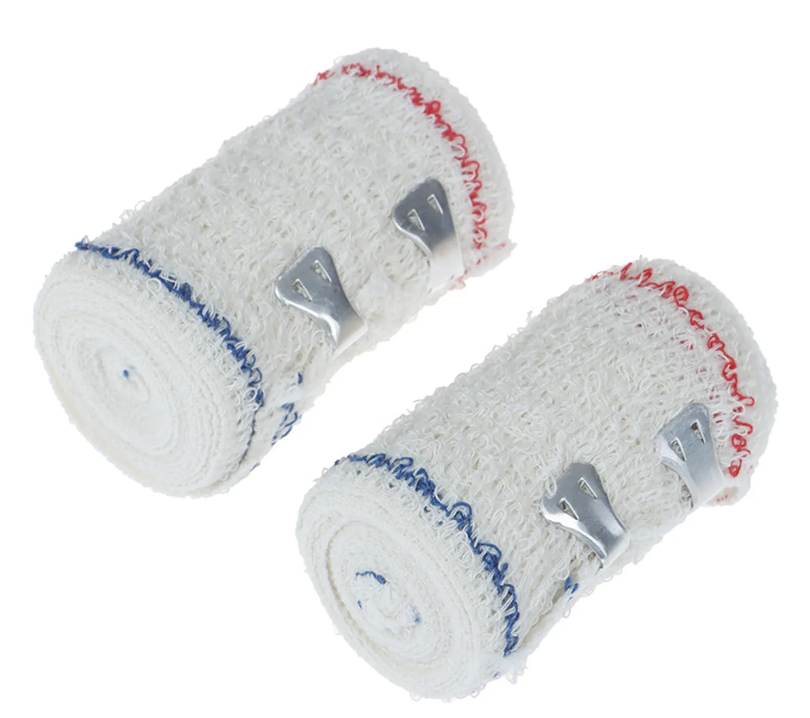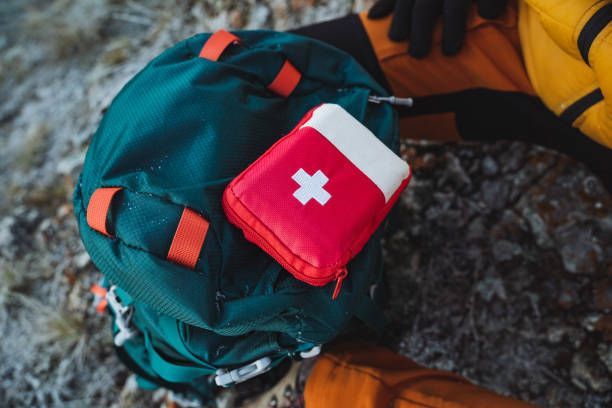
GET A QUOTE
What Should Be in a First Aid Kit for Mountain Biking?
Mountain biking is an exhilarating sport that combines the thrill of off-road adventure with the beauty of nature. However, this adrenaline-pumping activity comes with its risks. That's why carrying an Individual First Aid Kit (IFAK) is essential. Whether you're a seasoned rider or a beginner, knowing what should be in a first aid kit for mountain biking can make all the difference in an emergency. This blog will guide you through the essentials of an IFAK specifically tailored for mountain biking, ensuring you're prepared for any situation on the trails.
Why You Need a First Aid Kit for Mountain Biking
Mountain biking often takes you far from the comfort and convenience of urban areas, meaning help might not be immediately available. Trails can be rocky, unpredictable, and filled with potential hazards. Having a well-equipped first aid kit ensures that you can manage injuries and prevent minor issues from becoming major emergencies. Let's dive into what should be in a tactical IFAK for mountain biking to keep you safe on your adventures.
Essential Items for Your IFAK
Bandages and Dressings
- Adhesive Bandages: Carry a variety of sizes to cover small cuts and blisters.
- Gauze Pads: Essential for larger wounds and to stop bleeding.
- Sterile Dressings: For more serious injuries to keep wounds clean.
Antiseptics and Disinfectants
- Alcohol Wipes: For cleaning small cuts and abrasions.
- Antiseptic Cream: To prevent infections.
- Hydrogen Peroxide: Useful for cleaning wounds, though it should be used sparingly.
Pain Relief and Medications
- Ibuprofen or Acetaminophen: To help manage pain and inflammation.
- Antihistamines: Important for allergic reactions or stings.
Tools and Instruments
- Tweezers: For removing splinters or debris.
- Scissors: To cut dressings or tape.
- Medical Tape: To secure dressings and bandages.
Specialized Items
- Splint: For immobilizing broken bones or sprains.
- Elastic Bandages: For support in case of sprains.
- Emergency Blanket: To prevent hypothermia if you're stranded in cold weather.
Additional Considerations for Mountain Biking First Aid Kits
Personal Medications
If you have any personal medical conditions, ensure you include your medications in the first aid kit. This can include EpiPens for severe allergies, inhalers for asthma, or any other specific medications you might need.
Survival Essentials
While not strictly part of a first aid kit, consider including survival items like a whistle, compass, or multi-tool. These can be invaluable if you get lost or stranded.
Training and Knowledge
Having a well-stocked first aid kit is only part of the equation. Knowing how to use it is crucial. Consider taking a first aid course tailored to outdoor activities. This training can give you the confidence to handle emergencies effectively.
Packing Your First Aid Kit for Mountain Biking
Compact and Lightweight
When mountain biking, you want to keep your gear as light as possible. Choose a compact, lightweight first aid kit that fits easily in your backpack or bike bag. Many outdoor stores offer pre-packed kits designed specifically for hiking and biking, which can be a great starting point.
Waterproof and Durable
Your first aid kit should be waterproof to protect its contents from rain or accidental submersion. Durable packaging ensures that the kit can withstand the rough and tumble of mountain biking without the contents getting damaged.
Maintaining Your First Aid Kit
Regular Checks
Check your first aid kit regularly to ensure that all items are in good condition and within their expiration dates. Replace used or expired items promptly to keep the kit ready for use at all times.
Customization
As you gain more experience with mountain biking, you may find specific items that you prefer to include in your kit. Customize your first aid kit to suit your personal needs and the specific demands of your biking trails.
What Should Be in a First Aid Kit for Mountain Biking?
Cuts and Scrapes
Cuts and scrapes are the most common injuries in mountain biking. Ensure your first aid kit includes plenty of adhesive bandages, antiseptic wipes, and gauze pads to treat these minor injuries. Cleaning and covering the wound promptly helps prevent infection and promotes faster healing.
Sprains and Strains
Mountain biking often involves navigating uneven terrain, which can lead to sprains and strains. Elastic bandages and a small splint can be crucial in providing support and immobilization until you can get proper medical attention.
Fractures
While less common, fractures can occur during falls or collisions. A compact splint and strong medical tape are essential for stabilizing the injury. Knowing how to properly splint a fracture is equally important, so consider learning this skill through a first aid course.
Insect Bites and Stings
Insect bites and stings can range from annoying to dangerous, especially if you have allergies. Your first aid kit should include antihistamines and insect bite creams to manage these issues effectively. If you have severe allergies, always carry an EpiPen.
Emergency Situations
Severe Bleeding
Severe bleeding requires immediate attention. Include large sterile dressings and a tourniquet in your first aid kit. Knowing how to apply a tourniquet and stop severe bleeding can save a life.
Hypothermia and Heat Exhaustion
Mountain biking can expose you to varying weather conditions. An emergency blanket is essential for preventing hypothermia if you get stuck in cold weather. For hot conditions, include electrolyte tablets to help prevent heat exhaustion.
Dehydration
Always carry extra water and consider adding oral rehydration salts to your first aid kit. Dehydration can quickly become serious, especially on long rides in hot weather.
Conclusion
Mountain biking is a fantastic way to explore the great outdoors, but it comes with inherent risks. Being prepared with a well-stocked IFAK tailored for mountain biking can make a significant difference in handling injuries and emergencies. Remember, the key to effective first aid is not just having the right supplies but also knowing how to use them. Regularly check and update your kit, take a first aid course, and enjoy your mountain biking adventures with confidence.
When it comes to first aid kits, quality and reliability are paramount. This is where RisenMedical comes in. As a premier manufacturer of emergency and first aid kits, RisenMedical offers a wide array of high-quality first aid kit products and emergency first aid supplies, which are designed to meet your specific needs. Whether you’re an avid mountain biker or just someone who enjoys the occasional ride, RisenMedical's first aid kits provide the peace of mind that comes from knowing you’re prepared for any situation. Choose RisenMedical for your first aid needs, and ride with confidence knowing you have the best protection by your side. Stay safe and happy riding!



